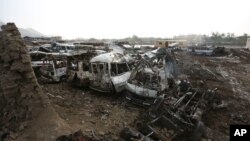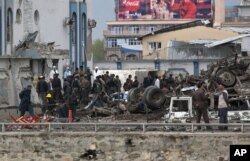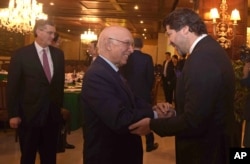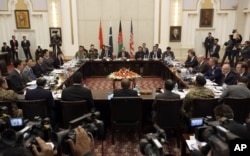Afghanistan’s national flag flew at half-staff in government offices and special prayers were offered in mosques across the country Friday to pay respects to the victims of this week’s deadly Taliban attack in Kabul.
The bomb-and-gun assault of a well-guarded building linked to the intelligence agency, the National Directorate for Security, killed nearly 70 people, mostly security forces.
Another 347 people, many of them civilians, were wounded in the deadliest Taliban strike in the capital since the Islamist group was ousted from power in 2001.
The violence has outraged Afghans.Demands are growing for President Ashraf Ghani's government to abandon plans to engage in peace talks with the Taliban, and instead intensify military operations against the insurgents.
Haqqani network suspected
But Afghan parliamentarians and media commentators are questioning abilities of the country’s security apparatus and security checks across the city for failing to prevent the violence.
“The attack, so close to the heart of the security and government apparatus, seemingly based on very precise intelligence and possibly aided by inside assistance, has raised questions again as to the government and security forces’ capacity to keep the capital safe,” wrote Kabul-based Afghanistan Analysts Network.
Authorities are increasingly pointing fingers at neighboring Pakistan, saying “initial evidence” suggested the Haqqani network carried out the attack.
Afghan and U.S. officials have long believed the militant network is based on Pakistani soil and has links to the country’s intelligence agency, ISI.
“Any attack the Haqqani group conducts is not possible without Pakistan’s help and this has been repeatedly proven in the last 14 years,” a presidential spokesman, Dawa Khan Meenapal, told VOA on Friday.
President Ghani is also being criticized for seeking Pakistan’s help in bringing fugitive Taliban leaders to the negotiating table.
“We have decided not to rely on Pakistan the way we did before the attack,” a senior aide to President Ghani told VOA, saying Tuesday’s attack was a "setback” for efforts to improve bilateral relations.
Peace efforts in doubt
The aide, requesting anonymity, said officials “don't believe Pakistan is genuine” in its resolve to help in the Afghan peace efforts.
He said the Taliban and Pakistani intelligence agency expected the insurgent group would make significant progress in the battlefield against Afghan security forces with the start of the so-called Taliban spring offensive.
“Unfortunately, Pakistani intelligence people were too enthusiastic about Taliban success prospects,” he said, insisting the Kabul attack stemmed from frustration and setbacks the Islamist insurgency suffered since it launched fighting against Afghan forces on April 12.
The presidential aide anticipated more Taliban attacks across Afghanistan in the next few weeks in their bid to capture a province, but expected the insurgent group to announce its readiness for peace talks with the government by the end of May.
[The Taliban] will not be able to [make any advances in the fighting]. If the fighting goes as it is for another two to three weeks, Pakistan will step forward and say they have now convinced the Taliban to join talks,”the Afghan adviser said.
Officials in Pakistan were not available immediately to comment on the Afghan assertions.
Pakistan condemned attack
Islamabad strongly condemned the Kabul attack hours after it happened. Thursday, Foreign Ministry spokesman Mohammad Nafees Zakaria reiterated his country's commitment to promote peace in Afghanistan.
"Pakistan has been engaged in sincere and consistent efforts to facilitate an Afghan-owned and Afghan-led peace process to bring lasting peace and stability in Afghanistan. We believe that violence and bloodshed is not the way to achieve peace," said Zakaria.
Pakistani leaders insist their counterterrorism gains are threatened if insecurity persists on the Afghan side of the border.
“We have contacted a few groups but no concrete result yet,” a Pakistani security official told VOA when asked whether Pakistan is still making efforts to arrange direct talks between the Afghan government and Taliban.
“We are on it but no time frame can be given,” the official said, requesting anonymity.







